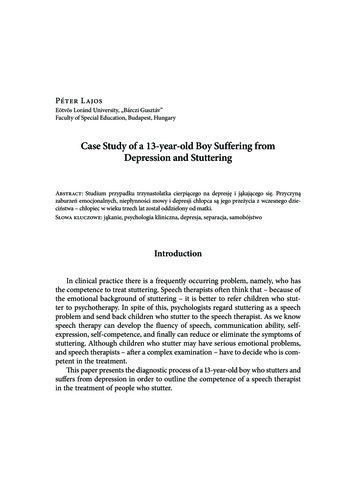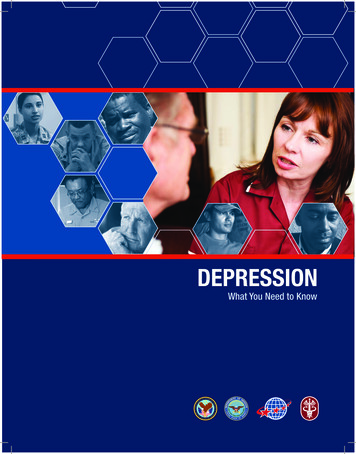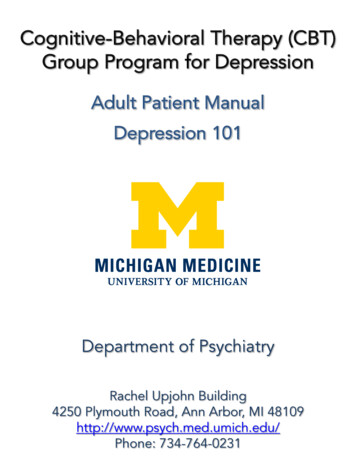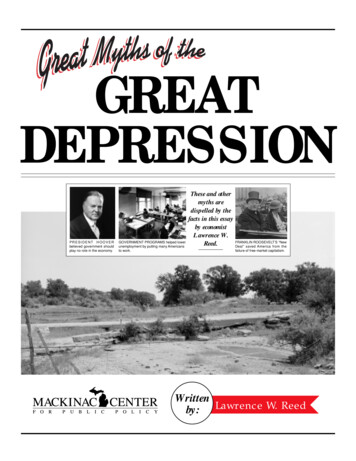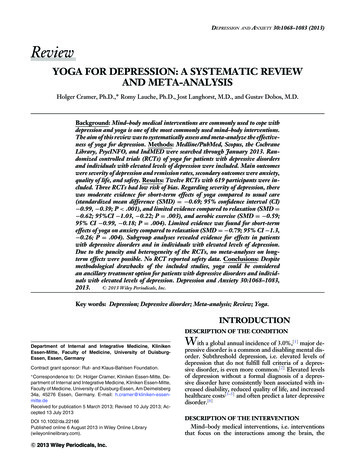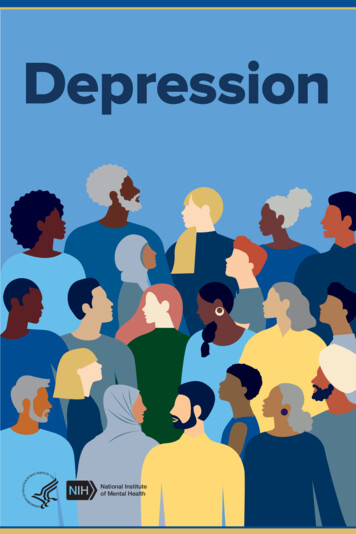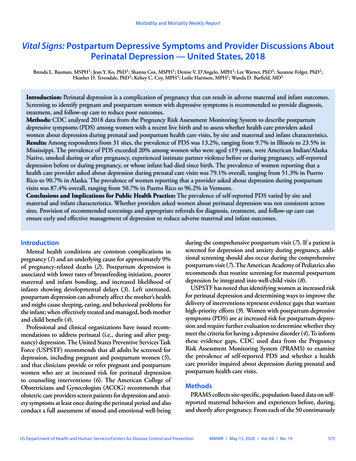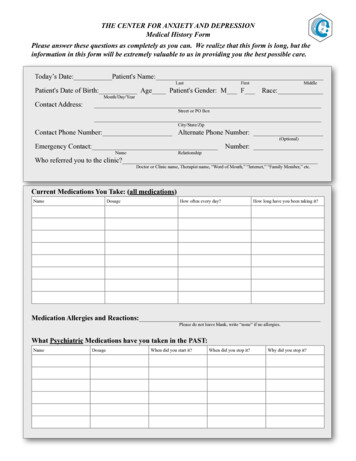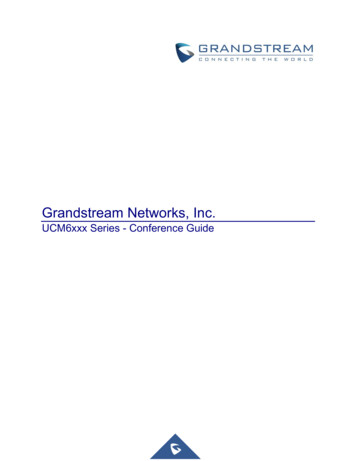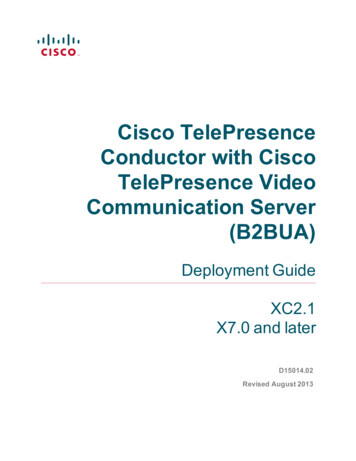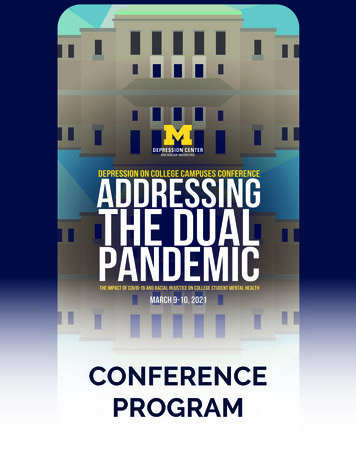
Transcription
CONFERENCEPROGRAM
TABLE OF CONTENTSThank You Donors! . . . . . . . . . . . . . . . . . 2Tuesday Conference Schedule . . . . . . 8Depression on College CampusesWednesday Conference Schedule . . . 9Conference Planning Committee . . . . . . 2George Orley StudentKeynote & Panel Descriptions . . . . . . . 10Mental Health Advocate Award . . . . . . . 3Session Descriptions . . . . . . . . . . . 11-13General Conference Information . . . . . . 4Speaker Profiles . . . . . . . . . . . . . . . 14-18Resources for U-M Students . . . . . . . . . 5THANK YOU DONORS!The Depression on College CampusesConference organizers would like tothank the following for their financialcontributions to this effort. Without theirsupport and collaboration, this Universitywide initiative would not be possible. Resources for Public . . . . . . . . . . . . . . . . 6Poster Session Titles . . . . . . . . . . . . . . . 7Katherine and Tom GoldbergDiane, Randy, Amanda and Sam Orley,in memory of George Orley2021 DEPRESSION ON COLLEGE CAMPUSES CONFERENCEPLANNING COMMITTEEJohn F. Greden, MD, Co-ChairRachel Upjohn Professor of Psychiatry andClinical NeurosciencesFounder, U-M Depression CenterFounding Chair, National Network ofDepression Centers (NNDC)Research Professor, Molecular andBehavioral Neuroscience InstituteRobert Ernst, MDAssociate Vice President for Student LifeExecutive Director, University Health ServiceAkilah Patterson, MPHStudy Coordinator, Healthy Minds StudyHealthy Minds NetworkAngie Farrehi, MA, LLPDirector, Office of Student Support andAccountabilityCollege of EngineeringStephanie Salazar, MPH, CHESOutreach & Education Program ManagerDepression CenterTodd Sevig, PhD, Co-ChairDirector, Counseling andPsychological ServicesChair, University of Michigan Mental HealthWork GroupEmma Flores-Scott, PhDDirector, Graduate Student Recruitment/Engagement/and PartnershipsRackham Graduate SchoolNadia Bazzy, MA, LLMFTDirector, Office of Multi-EthnicStudent AffairsStudent LifeSarah Daniels, MAAssociate Dean of StudentsDean of Students OfficeLaura Monschau, PhDCAPS Embedded Psychologist, RackhamGraduate SchoolCounseling and Psychological ServicesHannah DaviesUndergraduate StudentCollege of Literature, Science, and the ArtsToni Morales, MSWAcademic Standards Board MemberCollege of Literature, Science, and the ArtsMary Jo Desprez, MADirector, Wolverine WellnessUniversity Health ServiceTaylor Pahl, MSWProgram Coordinator for Outreachand EducationDepression Centerdepressioncenter.org2Rebecca Lindsay, MPH, CHESResearch Program Manager, YouthDepression and Suicide Prevention ProgramDepartment of Psychiatry@DepressionCntrADDRESSING THE DUAL PANDEMIC: THE IMPACT OF COVID-19 AND RACIAL INJUSTICEAnnika SeversonUndergraduate StudentMichigan Ross School of BusinessMeghna SinghUndergraduate StudentCollege of Literature, Science, and the ArtsKimberly Snodgrass, BSGraduate StudentSchool of Public HealthTracy Wright, RNNurse Consultant and Student CriticalEvents CoordinatorDivision of Student LifeAll Committee Members are part of theUniversity of Michigan mental health carecommunity.UniversityofMichiganDepressionCenter
2021 DEPRESSION ON COLLEGE CAMPUSES CONFERENCEGEORGE ORLEY STUDENT MENTAL HEALTH ADVOCATE AWARDSara Abelson, MPHMichael SczechowskiAbout the AwardDoctoral graduatestudent, U-M School ofPublic HealthSenior, Philosophy major,University of DelawareTo recognize outstandingstudent leadership in thearea of campus mentalhealth, the University ofMichigan initiated theStudent Mental HealthAdvocate Award in2007. Since 2009, theselection committee haspresented two awards – one to a studentfrom the University of Michigan, and one toa student from another school – allowingus to honor student advocacy around thecountry as well as on our own campus.Sara Abelson is anationally recognizedexpert who has dedicatedherself to improvingstudent mental healthat Michigan and beyond. Sara’s researchfocuses on student mental health, with aparticular emphasis on equity. Her advisor,Daniel Eisenberg, describes her as a“stellar scholar with a genuine passion forimproving how colleges and universitiessupport the development and well-beingof college students” and as someone who“has made important contributions tocollege health through advocacy, education,and research.” Sara is a member of theRackham Graduate School’s Task Force onStudent Mental Health, leading last year’sworking group on Rackham-level changesand this year’s public safety and policingworking group, which only exists thanksto her advocacy! She played an integralrole in writing and shaping the task forcereport, including the recommendations,all of which have been accepted. Sara hascontributed to U-M inclusion efforts throughmany channels including leadership with theNetwork for Doctoral Diversity.As a graduate student, Sara has positivelyimpacted student mental health nationallythrough producing resources for collegeadministrators, such as a Higher EducationToday article on centering equity in studentmental health task forces (their fifth mostread article in 2020). She’s advised andhelped lead student mental health initiativeswith the American Council on Education,Great Lakes Colleges Association, SteveFund, National Center for InstitutionalDiversity, Bringing Theory to Practice,American Cancer Society, and President ofthe University of Minnesota. She’s facilitatedcollecting important new data on studentmental health as Lead for Diversity, Equityand Inclusion Projects for the Healthy MindsNetwork.In October of 2020,Sean’s House wascreated as a non-profit24/7 mental healthsafe haven located onUniversity of Delaware’scampus. Sean’s House provides peersupport to teens and young adultsstruggling with mental health issues free ofcharge, with a focus on suicide prevention.The overwhelming support Sean’s Househas received thus far is remarkable,and much of the success wouldn’t bepossible without Michael. He jumpedat the opportunity to be a peer supportspecialist and completed weeks of trainingto volunteer his time helping those whohave been struggling, especially during thepandemic.Due to COVID-19, many of the volunteerswere unable to donate their time. Michaelsaw the impact this would have onSean’s House’s ability to provide servicesto the community and stepped up in atremendous way. Michael has donatedover 200 hours in the past few months andhas helped to serve over 500 individualssince the opening of Sean’s House. Hehas played an integral role in training thenext cohort of peers, providing additionalresources to offer guests, and has evenvolunteered covering night shifts, whichmakes the 24/7 program possible.Michael’s compassion and natural ability tohelp others has made lasting impressionson every guest who has walked through thedoors. He treats everyone with empathyand sincerity and provides the safe spacethat many teens and young adults need tofeel comfortable sharing their experiences.His dedication to improving mental healthoutcomes for his peers is truly inspiringand he will continue changing the lives ofmany as he enters graduate school.The undergraduate and graduate studentswho have been nominated from acrossthe country for this prestigious awardhave all made a significant impact in theircampus communities by raising awarenessof mental health issues, advocating formental health services on campus, andhelping to reduce the stigma of depressiveillnesses.In 2019, Randy and Diane Orley ofBloomfield Hills, Michigan along withtheir children Amanda and Sam Orleyestablished an endowment at theUniversity to fund this award in perpetuity.The George Orley Student Mental HealthAdvocate Award is named to honor thememory of Randy and Diane’s son, andAmanda and Sam’s brother, George, whosebattle with depression ended prior to hisjunior year at the University of Michiganin August 2013. Since losing George, theOrley family has devoted time, energyand resources to strengthen supports foryoung people struggling with mental healthissues.For their tireless advocacy and for theirgenerous support in funding this award,we extend our gratitude to Randy, Diane,Amanda and Sam Orley.ADDRESSING THE DUAL PANDEMIC: THE IMPACT OF COVID-19 AND RACIAL INJUSTICE3
GENERAL CONFERENCE INFORMATIONConference MaterialsEvaluation FormsSAVE THE DATE FOR 2022!Virtual sessions will be recorded (withpermission) and available for viewing byregistered attendees on the DepressionCenter website following the conference:depressioncenter.org/docc.Please remember to complete anevaluation form for each session youattend, and for the overall conference.Links for the evaluation forms for theoverall conference and plenary sessionscan be found at:depressioncenter.org/evals.Our annual conference is set for March9-10, 2022, in Ann Arbor, Michigan.We hope you can join us!Continuing Education CreditsContinuing education credits are availablefor certified health education specialistsand social workers.To obtain continuing education credit, youmust be present at the time of the livepresentation and virtually sign in and outof each workshop and concurrent sessionyou attend. You must also complete anevaluation for each presentation thatyou attend, as well as for the overallconference.The University of Michigan DepressionCenter is an approved provider withthe Michigan Social Work ContinuingEducation Collaborative. ApprovedProvider Number: MICEC-0063. Thiscourse is approved for 8 CE clock hours.Out of state providers may need tocontact their state licensing organizationfor answers about continuing educationrequirements.This program is designated for CertifiedHealth Education Specialists (CHES) and/or Master Certified Health EducationSpecialists (MCHES) to receive up to8.5 total Category I contact educationcontact hours. Maximum advanced-levelcontinuing education contact hoursavailable are 0.depressioncenter.org4These evaluations will help us to plan forfuture conferences. THANK YOU!Resource TableFree educational and informationalmaterials from a variety of organizationswill be available at the virtual resourcetable. Posters will also be available forviewing in the poster booth on the secondday. Please take a moment during thebreaks to look through these resources.Speed NetworkingSpeed networking will be open duringbreaks. Stop in and meet someone new!Social MediaCreate or join the conversation! Use#DOCC on Twitter during the conference.Be sure to follow the Depression Centeron Twitter (@DepressionCntr) andFacebook.Help Improve DOCC!PLEASE EVALUATE SING THE DUAL PANDEMIC: THE IMPACT OF COVID-19 AND RACIAL INJUSTICEUniversityofMichiganDepressionCenter
2021 DEPRESSION ON COLLEGE CAMPUSES CONFERENCERESOURCES FOR U-M STUDENTSActive Minds at U-MA chapter of Active Minds, Inc. that isfocused on peer-to-peer mental healthadvocacy and awareness.Addiction Treatment Services (UMATS)Offers clinical care for people recoveringfrom addiction and chemical dependency,including assessments and a full range oftherapy options.Athletes ConnectedA collaborative initiative developed by theUniversity of Michigan School of Social Work,Depression Center, and Athletic Departmentto increase awareness of mental healthissues, reduce the stigma of help-seeking,and promote positive coping skills amongstudent athletes.Campus Mind WorksA website and outreach initiative developedby the U-M Depression Center which providessupport for students with mental healthdisorders. The website contains an extensivedatabase to help students easily locate themost appropriate support resources fortheir particular needs. In addition, the siteprovides self-care tools and strategies to helpstudents manage their symptoms and stayhealthy within the context of college life.Counseling and PsychologicalServices (CAPS)Offers a variety of services to help studentsresolve personal difficulties and acquirethe skills, attitudes, and knowledge that willenable them to take full advantage of theirexperiences at U-M.MiTalkA website with mental health resources suchas online screenings for depression andanxiety, skill-building tools, and recordedworkshops, lectures, and relaxationexercises.Michigan Medicine ComprehensiveEating Disorders ProgramThe U-M Comprehensive Eating DisordersProgram provides individualized,compassionate, evidence-based care forpatients age 8-24 with eating disorders.Office of Services for Studentswith DisabilitiesThe mission of the Office of Services forStudents with Disabilities is to supportthe University’s commitment to equity anddiversity by providing support services andacademic accommodations to students withdisabilities. Disabilities include students withmental health conditions, visual impairments,learning disabilities, ADHD, traumatic braininjury, autism spectrum disorders, mobilityimpairments, hearing impairments, andchronic health problems.Office of Student ConflictResolution (OSCR)OSCR has, among its responsibilities, thecommitment to help students learn skills formanaging conflict in daily life.Psychiatric Emergency Services (PES)PES provides emergency/urgent walk-inevaluation and crisis phone services 24hours a day, 7 days a week, for people of allages. Located in the University of MichiganHospital, 1500 East Medical Center Drive.(734) 936-5900Psychological ClinicA wide range of mental health servicesfor those who are 18 years and older andincludes individual and group therapy.U-M Division of Public Safetyand Security (DPSS)DPSS can do “wellness checks” for students.Consider calling if you are concerned abouta student’s well-being. For emergencies call911; for non-emergencies call 734-763-1131.Peers Utilizing Leadership Skills forEducation (PULSE)A student-run organization sponsored byUniversity Health Services promoting healthand wellness in residential communities,Greek houses, and across campusthrough peer interactions and informativeprogramming. Have questions? Emailaskpulse@umich.edu.Sexual Assault Prevention and AwarenessCenter (SAPAC)Educational, advocacy, and supportiveservices for the U-M community for survivorsof sexual assault, intimate partner violence,sexual harassment, and stalking.Spectrum CenterEducation, information and advocacyservices to create an open, safe, andinclusive environment for LGBTQ students,staff, and faculty of the campus and localcommunity.Student LifeStudent Life consists of many criticalservices that support University of Michiganstudents and help them to get the most outof their time at the University. The Office ofthe Vice President for Student Life housesthe central location for Student Life, whichis committed to preparing students to livelives of dignity and purpose, to channel newknowledge to humane ends, and to promotethe public good.University Health Service (UHS)A comprehensive campus health resource.Includes the Body-Peace Corps, a sponsoredstudent organization whose members arepassionate about promoting positive bodyimage and preventing eating disorders.Wolverine Support Network (WSN)Wolverine Support Network empowersUniversity of Michigan students to createan inclusive community and support eachother’s identity, mental well-being, and day-today lives through peer-facilitated groups andbi-weekly community events.Additional Advising ResourcesCollege of Literature, Science, and the ArtsNewnan Academic Advising Center1255 Angell Hall, 435 South State Street734-764-0332 ask.lsa.advising@umich.eduCollege of EngineeringConsultation, Assistance, and Resourcesin Engineering (C.A.R.E.) Center129 Chrysler Center734-615-1405 engin-support@umich.eduRackham Graduate SchoolRackham’s Resolution Officer1120 Rackham Building915 E. Washington Street734-764-4400 RackResolutionOfficer@umich.eduADDRESSING THE DUAL PANDEMIC: THE IMPACT OF COVID-19 AND RACIAL INJUSTICE5
RESOURCES FOR THE PUBLICActive MindsPowered by a network of student advocates,Active Minds is the nation’s premier nonprofitorganization supporting mental healthawareness and education for students.American Association ofSuicidology (AAS)Promotes the understanding and preventionof suicide and supports those who have beenaffected by it.American Psychiatric Association (APA)Information about mental health fromthe APA, the world’s largest psychiatricorganization.American Foundation for SuicidePrevention (AFSP)Works toward understanding and preventingsuicide through research, policy andeducation, and reaching out to people withmood disorders and those affected bysuicide.Anxiety and Depression Association ofAmerica (ADAA)Non-profit organization dedicated to theprevention, treatment, and cure of anxiety,depressive, obsessive-compulsive, andtrauma-related disorders through education,practice, and research.Depression and Bipolar SupportAlliance (DBSA)Patient-directed organization focusing ondepression and bipolar disorder. DBSAworks to ensure that people living with mooddisorders are treated equitably.Based at the U-M Depression Center,with collaborations with other prominentacademic medical institutions, the PrechterProgram supports cutting-edge researchin psychiatric genetics, pediatric bipolardisorder, neuroimaging and neuroscience inorder to find a cure for bipolar disease.The Jed FoundationThe Jed Foundation is one of the nation’sleading organizations working to reduceemotional distress and prevent suicideamong teens and young adults. The JedFoundation has programs for colleges, highschools, students, and parents.Mental Health America (MHA)A national community-based nonprofitdedicated to addressing the needs of thoseliving with mental illness and to promotingthe overall mental health of all Americans.National Alliance on MentalIllness (NAMI)The largest grassroots mental healthorganization dedicated to building better livesfor the millions of Americans affected bymental illness.National Institute of MentalHealth (NIMH)Information about mental health from theU.S. government.Seize the AwkwardHelps families recognize and cope withdepressive disorders.Ad campaign developed by the AmericanFoundation for Suicide Prevention, inpartnership with the Jed Foundation and theAd Council, to empower teens and youngadults to reach out and help a friend who maybe struggling with their mental health.HelpGuideSuicide Prevention Resource CenterFamilies for Depression AwarenessProvides empowering, evidence-basedinformation that can be used to helpindividuals and their loved ones.6Heinz C. Prechter BipolarResearch ProgramA federally funded organization that providesprevention support, training, and resourcematerials to strengthen suicide preventionnetworks.ADDRESSING THE DUAL PANDEMIC: THE IMPACT OF COVID-19 AND RACIAL INJUSTICEThe Steve FundThe Steve Fund works with colleges anduniversities, non-profits, researchers, mentalhealth experts, families, and young people topromote programs and strategies that buildunderstanding and assistance for the mentaland emotional health of the nation’s youngpeople of color.ULifelineAn online resource center for college studentmental health and emotional well being,aimed at students and campus professionals.University Center for the Child &the Family (UCCF)Offers a comprehensive range of mentalhealth services for children and familiesin the Ann Arbor community. Researchopportunities are available for qualifyingindividuals.University of Michigan Depression CenterThe University of Michigan DepressionCenter is the first ever multi-disciplinarycenter dedicated to research, education, andtreatment of depressive and bipolar illnesses.The Depression Center brings together theworld-class resources of Michigan Medicineand many of the U-M Schools and Colleges.The result: a unified approach to diagnosing,understanding, treating—and eventuallypreventing—depression.
2021 DEPRESSION ON COLLEGE CAMPUSES CONFERENCEPOSTER SESSION TITLES2020 Educational Perspectives Survey: Depression, Anxiety,and Distraction in the Virtual Learning EnvironmentAshley Parks, DrPH, MBA, MPH, MTech, MCHES1;Matthew Lazari, MHA, FACHE212Integrating Prevention, Advocacy, Teaching, and Research inDepression Screenings on a College CampusZornitsa Kalibatseva, PhD; Christine Ferri, PhD;Nate Morell, MSW, LCSW; Julie Coker, BSW; Loretta Mooney, PhDCalifornia Baptist UniversityCHOC Health & University of Southern CaliforniaStockton UniversityA Longitudinal Medical Student Mental Health Survey:Preliminary ResultsHai-Uyen Nguyen, BA1; Kristie Pham Tu, BS1; Shayna Ratner, MD2;Madhukar H. Trivedi, MD1; Tracy Greer, PhD1; Preston Wiles, MD1;Maria Monastirsky, MS112University of Texas SouthwesternColumbia UniversityA Mixed Methods Investigation of Gender Differences inMental Health Help-Seeking Among Black College Menand WomenJanelle R. Goodwill, MSW; Atiya Addie; Safa MohamedResilientNU: Enhancing Student Social and Emotional Wellnessthrough Small Group ProgrammingSamantha Conway, MA, LCSW; Angela E. Mitchell, MA, LCSWThe Impact of COVID-19 Pandemic on International Students’Mental HealthIsmatara Reena, EdD, MBBS, CHES1;Nirmal Chandra Gope, MEd1;Shankari Mondal Dipti, BA1; Kumer Pial Das, PhD1;Edward Hebert, PhD2; Raymond Doe, PhD3Career/Life Training and Mental Health Outcomes forUnderserved College StudentsMaya Hareli, BA1; Carol Hundert, MA1; Colleen Conley, PhD1;Christie Asif, MA1; Meg Seth, MA22University of Illinois at ChicagoNorthwestern UniversityUniversity of Michigan1Positioning Well-being as an Equity Issue: The Impact of aCredit-Bearing Mental Health and Well-being Curriculum onHistorically Marginalized StudentsLeah Goodman, OTD, OTR/L; Michelle Manno, PhDUniversity of Louisiana at LafayetteSoutheastern Louisiana University3Lamar University12Loyola University ChicagoDePaul UniversityCaring Collaborations Across Campus: WSU’s Counseling andPsychological Services, WSU’s Office of Multicultural StudentEngagement and WSU’s Warrior Vision and Impact ProgramsJennifer Fuller-Bohanon, MA, LPC; Leonard Savala III, PhD;Stephanie Hawkes, EdD; Kenya Swanson, MEdWayne State UniversityThe Healthy Minds Network: College Student Mental HealthData: Covid-19 and Racial InjusticeMatthew Jirsa, BA1; Sarah Ketchen Lipson, PhD, MEd2;Sasha Zhou, PhD3; Sara Abelson, MPH1; Justin Heinze, PhD1;Jasmine Morigney, BA4, Akilah Patterson, MPH1;Amber Talaski, MPH1; Meghna Singh1; Adam Wheeler, MPH1; DanielEisenberg, PhD5University of Michigan2Boston University3Wayne State University4Eastern Michigan University5University of California, Los AngelesThe Impact of Emotional Intelligence Training on COVID-RelatedWorry in College StudentsCarol Hundert, MA; Abigail Blum, BA; Maya Hareli, BA; ColleenConley, PhDLoyola University ChicagoThe Role of Race/Ethnicity and Acculturation in Different Typesof Stigma and Mental Health Service UtilizationKristen Fleming, BA; Zornitsa Kalibatseva, PhDStockton UniversityUsing Tailored Feedback to Increase Mental Health SupportSeeking Among Non-White Students: A Theory of PlannedBehavior InterventionEmily Derecktor, BA; Eran Magen, PhD; Marian Reiff, PhDUniversity of Pennsylvania1Wolverine Support Network: A Peer Support Model ReshapingStudent Mental HealthNick Brdar; Liadan SolomonUniversity of MichiganHow to Utilize Remote Telemental Health and Creative VirtualOutreach Activities to Promote Mental Health on Campus duringthe COVID-19 Pandemic, Reduce Stigma of Counseling, andServe Those Indigenous and Marginalized Student PopulationChun-Fang “Frank” Kuo, PhDUniversity of Hawaii at HiloADDRESSING THE DUAL PANDEMIC: THE IMPACT OF COVID-19 AND RACIAL INJUSTICE7
TUESDAY, MARCH 9, 2021 (All times Eastern)12:00 OPENING KEYNOTE1:30 p.m.The Mental Health and Well-Being of Students of Color: COVID and BeyondDavid Rivera, PhD, Associate Professor of Counselor Education, Queens College, City University of New York;Carlota Ocampo, PhD, Provost, Trinity Washington University;Farha Abbasi, MD, Assistant Professor of Psychiatry, Michigan State University;Chevaughn Wellington, Medical Student, Quinnipiac University1:45 CONCURRENT SESSIONS2:45 p.m.The Impact of COVID-19 on College Student Mental Health and Wellbeing: Data from the Healthy Minds Study and theACHA National College Health Assessment IIIAkilah Patterson, MPH, Study Coordinator, Healthy Minds Study, University of Michigan;Mary Hoban, PhD, Chief Research Officer, American College Health AssociationLet’s Talk About Wellness: Race, Ethnicity, and Wellbeing at a Predominately White InstitutionLaura McAndrew, MPH, PMP, Health Educator, Sexual Health, Wolverine Wellness,University Health Service, University of Michigan;Chidimma Ozor Commer, LLMSW, MA, E-RYT 200, RYT 500, YACEP, Chidimma Ozor ConsultingLeading the Charge: Collectively Navigating Student-Athlete Mental Health & WellnessAbigail Eiler, MSW, LMSW-Clinical, QMHP, Assistant AD, Director of Athletic Counseling, Clinical Assistant Professor of SocialWork, University of Michigan, Big Ten Mental Health & Wellness Cabinet;Brad Foltz, PhD, Counseling and Sport Psychologist, Purdue University, Big Ten Mental Health & Wellness Cabinet;Adam Neuman, JD, MPA, Chief of Staff, Strategy and Operations & Deputy General Counsel,Office of the Commissioner, Big Ten Conference;Michelle Garvin, PhD, Director of Clinical and Sports Psychology, University of Maryland,Big Ten Mental Health & Wellness Cabinet;Randy Ballard, MS, Associate Director of Athletics, Sports Medicine, Director of Integrated Performance, University of Illinois,Big Ten Mental Health & Wellness Cabinet3:00 MINI-WORKSHOPS4:30 p.m.Equity in Mental Health: Support Strategies for Diverse Student PopulationsSofia B. Pertuz, PhD, Chief Diversity & Inclusion Officer, The JED Foundation;Jan Collins-Eaglin, PhD, Senior Scientific Advisor, Project Lead, Equity in Mental Health Framework for the Steve FundHow to Address Religion and Spirituality in Support of Student Wellbeing with Clients in a Non-Religious InstitutionKaifa Alsoofy, LMSW, University Counselor II, Counseling and Psychological Services, Wayne State University;Ebony Fails, MA, LPC, University Counselor II, Counseling and Psychological Services, Wayne State University4:45 POSTER & NETWORKING SESSION6:00 p.m.8ADDRESSING THE DUAL PANDEMIC: THE IMPACT OF COVID-19 AND RACIAL INJUSTICE
2021 DEPRESSION ON COLLEGE CAMPUSES CONFERENCEWEDNESDAY, MARCH 10, 2021 (All times Eastern)12:00 PANEL DISCUSSION & PRESENTATION OF THE GEORGE ORLEY STUDENT MENTAL HEALTH ADVOCATE AWARD1:30 p.m.Mental Health and the Dual Pandemic: The Student ExperienceBrandon Bond, Masters Candidate, School of Public Health, School of Social Work, University of Michigan;Ananya Cleetus, Undergraduate Student, University of Illinois Urbana-Champaign;Tran Doan, PhD candidate, School of Public Health, University of Michigan;Geela Margo Ramos, Undergraduate Student, University of Central Florida;Preetam Vupputuri, Undergraduate Student, University of Michigan;Moderator: Joy Pehlke, MEd, Health Educator, Wellness, Coach, Lead of Student Engagement & Academic Partnerships,Wolverine Wellness, University of Michigan1:45 CONCURRENT SESSIONS2:45 p.m.Addressing Mental Health and Wellbeing, and the Impacts of COVID-19 in Higher EducationJeena Thomas, MS, National Academies of Science, Engineering, and Medicine Program Officer for the Committee on Womenin Science, Engineering, and Medicine (CWSEM) and the Board on Higher Education and Workforce in the Policy and GlobalAffairs DivisionInstitutionalizing Vulnerability: Why Creating Psychological Safety is Critical to Inclusive ExcellenceErin McClintock, MEd, Head of Impact, Social and Emotional Learning, EVERFI;Jesse Bridges, MEd, Senior Vice President of Diversity, Equity, and Inclusion, EVERFIShaping Black College Men’s Mental Health with Social Media Tools: The YBMen ProjectDaphne C. Watkins, PhD, Professor of Social Work, Founder and Director of the YBMen Project, University of Michigan3:00 International Student Mental Health —Here and Abroad4:00 p.m. Victor Hong, MD, Psychiatrist, University of Michigan;Ludmila Barbosa DeFaria, MD, Clinical Assistant Professor, University of FloridaAddressing Student Loneliness Through Research & DesignNathaan Demers, PsyD, Vice President and Director of Clinical Programs, YOU at CollegeActive Minds: Your Voice is Your Power PanelAmy Gatto, MPH, Senior Campus Program Manager, Active Minds;Robyn Suchy, BA, Chapter Manager, Active Minds4:15 CLOSING KEYNOTE5:15 p.m.Campus Climate as a Mental Health Equity Issue: Centering the Diverse Experiences of Students of ColorTabbye Chavous, PhD, Director, National Center for Institutional Diversity (NCID), Associate Vice President for Research,Professor of Education, Professor of Psychology, University of MichiganADDRESSING THE DUAL PANDEMIC: THE IMPACT OF COVID-19 AND RACIAL INJUSTICE9
KEYNOTE AND PANEL DISCUSSION DESCRIPTIONSOpening KeynoteClosing KeynoteTuesday, March 9 12:00 - 1:30 p.m.Wednesday, March 10 4:15 - 5:15 p.m.The Mental Health and Well-Being of Students of Color:COVID and BeyondDavid Rivera, PhD, Associate Professor of Counselor Education,Queens College, City University of New York; Carlota Ocampo, PhD,Provost, Trinity Washington University; Farha Abbasi, MD, AssistantProfessor of Psychiatry, Michigan State University;Chevaughn Wellington, Medical Student, Quinnipiac UniversityCampus Climate as a Mental Health Equity Issue:Centering the Diverse Experiences of Students of ColorTabbye Chavous, PhD, Director, National Center for InstitutionalDiversity (NCID), Associate Vice President for Research, Professor ofEducation, Professor of Psychology, University of MichiganThe COVID-19 pandemic, along with the murder of George Floyd,brought into stark view the deeply ingrained racial inequalities inour country. This session will highlight a set of recommendationsfor higher education professionals to better understand how theircampus communities have been affected as a result of our currentevents and how they can support the mental health and well-beingof students of color.The sessi
The University of Michigan Depression Center is an approved provider with the Michigan Social Work Continuing Education Collaborative. Approved Provider Number: MICEC-0063. This course is approved for 8 CE clock hours. Out of state providers may need to contact their state licensing organization for answers about continuing education requirements .
